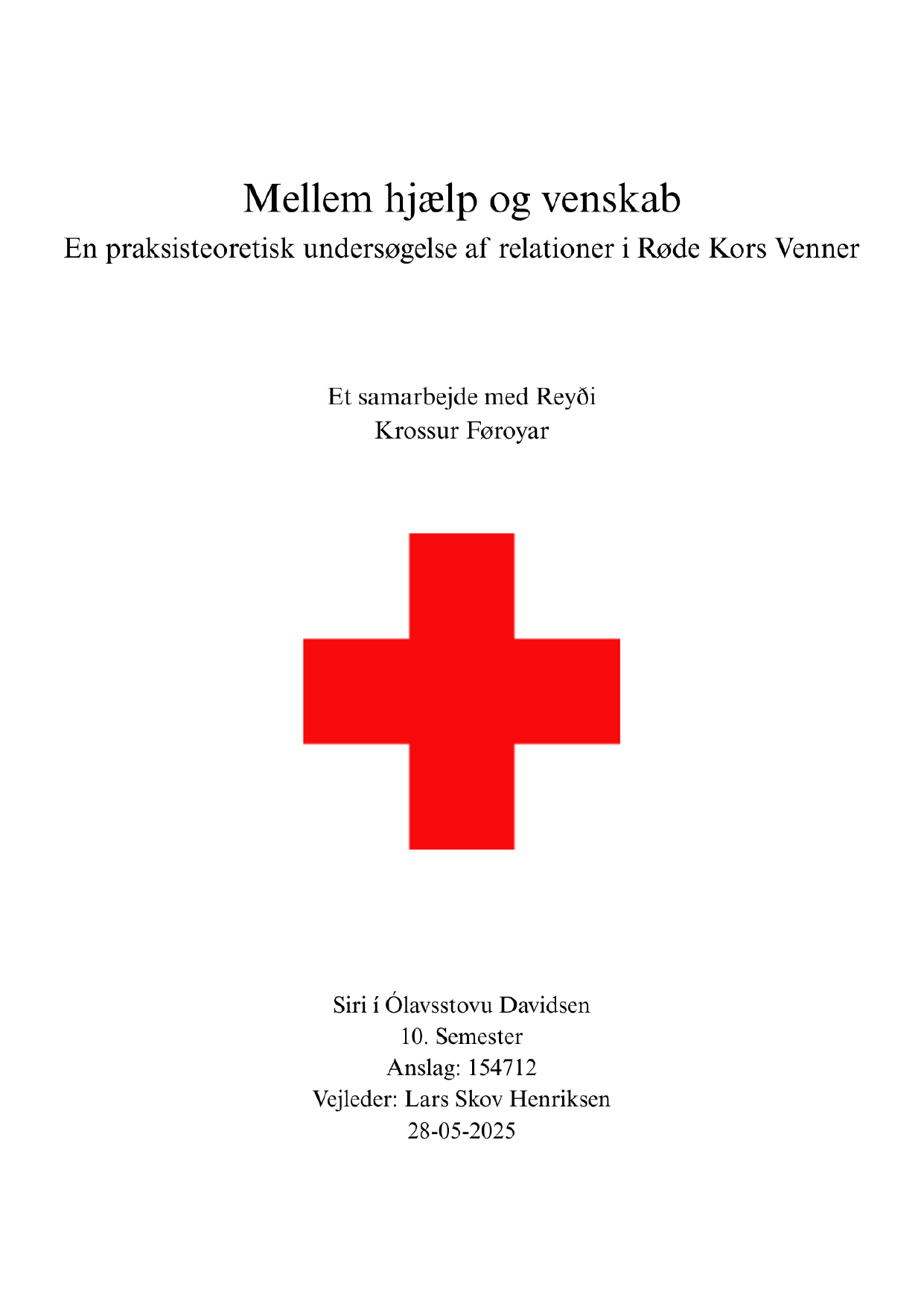
Mellem hjælp og venskab - En praksisteoretisk undersøgelse af relationer i Røde Kors Venner
Oversat titel
Inbetween helper and friend - a practice theoretical study of relations in Red Cross Buddy programme
Forfatter
Semester
4. semester
Uddannelse
Udgivelsesår
2025
Afleveret
2025-05-28
Antal sider
65
Abstract
This thesis examines integration as a relatively new phenomenon in the Faroe Islands and the role civil society can play in this process. The thesis focuses on an integration initiative from Red Cross, called The Red Cross Buddy Program, where people with a refugee or immigrant background are matched with a local volunteer buddy or friendship family. Through 12 qualitative interviews with 6 buddy pairs, the thesis explores the friendship between Ukrainian refugees and local Faroese volunteers as a social practice. The study draws upon theories of emotional labour, sympathy economy, and habitus to investigate the emotional dynamics and asymmetries present in the relationships. The findings show that while some buddy relations evolve into mutual friendships, others remain more instrumental or emotionally uneven yet still provide important social support and access to cultural, linguistic, and social domains that are often difficult for newcomers to get access to in the Faroese Islands. The analysis highlights how the close and overlapping social structures in the Faroe Islands influence the expectations and boundaries of the buddy relationship. It demonstrates how the overlap of private, social, and voluntary roles creates both opportunities and challenges for participants. While the volunteer can act as a bridge into Faroese society, this position can also produce emotional strain and uncertainty in role expectations. Simultaneously, the Ukrainian participants often express gratitude and positivity, which is related to a social obligation to appear thankful in asymmetrical relationships. The study argues that the Red Cross Buddy Program functions as a social practice where integration does not occur as a set outcome, but rather as an ongoing and relational process embedded in everyday life. Through emotional involvement and shared participation, the buddy relationship creates potential for belonging, mutual learning, and access to otherwise closed social networks in the Faroese society. The thesis contributes to a more nuanced understanding of integration by showing how it is shaped not only by institutional frameworks, but in personal relationships facilitated by an organization.
This thesis examines integration as a relatively new phenomenon in the Faroe Islands and the role civil society can play in this process. The thesis focuses on an integration initiative from Red Cross, called The Red Cross Buddy Program, where people with a refugee or immigrant background are matched with a local volunteer buddy or friendship family. Through 12 qualitative interviews with 6 buddy pairs, the thesis explores the friendship between Ukrainian refugees and local Faroese volunteers as a social practice. The study draws upon theories of emotional labour, sympathy economy, and habitus to investigate the emotional dynamics and asymmetries present in the relationships. The findings show that while some buddy relations evolve into mutual friendships, others remain more instrumental or emotionally uneven yet still provide important social support and access to cultural, linguistic, and social domains that are often difficult for newcomers to get access to in the Faroese Islands. The analysis highlights how the close and overlapping social structures in the Faroe Islands influence the expectations and boundaries of the buddy relationship. It demonstrates how the overlap of private, social, and voluntary roles creates both opportunities and challenges for participants. While the volunteer can act as a bridge into Faroese society, this position can also produce emotional strain and uncertainty in role expectations. Simultaneously, the Ukrainian participants often express gratitude and positivity, which is related to a social obligation to appear thankful in asymmetrical relationships. The study argues that the Red Cross Buddy Program functions as a social practice where integration does not occur as a set outcome, but rather as an ongoing and relational process embedded in everyday life. Through emotional involvement and shared participation, the buddy relationship creates potential for belonging, mutual learning, and access to otherwise closed social networks in the Faroese society. The thesis contributes to a more nuanced understanding of integration by showing how it is shaped not only by institutional frameworks, but in personal relationships facilitated by an organization.
Emneord
